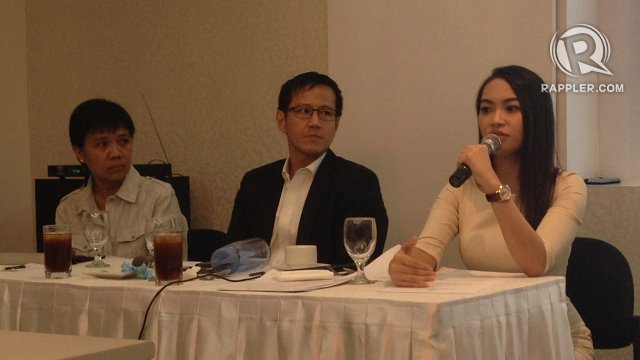SUMMARY
This is AI generated summarization, which may have errors. For context, always refer to the full article.

MANILA, Philippines (Updated) – Misamis Occidental Representative Jorge Almonte, chairman of the House committee on public information, remains the biggest obstacle to the passage of the Freedom of Information, advocates said on Monday, January 20.
In a press conference, they slammed Almonte for failing to convene and set meetings for the technical working group (TWG) tasked to consolidate all versions of the measure, which seeks to institutionalize fast procedures in accessing documents of high public interest.
“The biggest hurdle right now in the House is the [public information] committee chair,” DIWA Rep Emmeline Aglipay said in a press conference Monday, January 20.
The House committee on public information earlier set Feb 15, 2014, as the deadline for the TWG to finish consolidating all versions of FOI passed in the House. Almonte also heads the TWG.
As Congress resumed session Monday, Aglipay said there was still “no word” from Almonte about the schedule of meetings for the TWG.
“If he was sincere and really wanted to discuss the bills, then he would have set meetings. It seems he doesn’t want to discuss the bills,” Aglipay said.
Sought for his reaction, Almonte said: “I have been saying that I’m just trying to follow the rules. I have to follow the rules in order to be safe. It’s up for her to think otherwise. I can’t help if that is so.”
Asked what rules he was referring to, Almonte said: “Other than FOI bills, there are more than 46 bills referred to us and more than 20 of these are FOI bills. Other authors are also entitled to the consideration of their bills.”
This is not the first time that the committee chair in the House has been blamed for allegedly delaying the passage of the FOI bill.
In the 15th Congress, then committee chair Eastern Samar Representative Ben Evardone was slammed for failing to conduct enough acommittee hearings, preventing the measure from being discussed in plenary.
TWG meeting in February
Asked when he would , Almonte said he would “consider the month of February” to convene the TWG.
“Barring any unforeseen circumstance, we have the time to meet before the February 15 deadline. That is the process. There are other authors. These are their initial bills and I suppose we have to go through them. We can’t ignore the fact that there are people also interested in having their ideas. All authors should be reflected as much as possible in the proposed measure,” Almonte said.
The FOI bill has historically had an uphill battle in the House of Representatives, unlike in the Senate.
In the 15th Congress, senators managed to pass the measure on 3rd and final reading while representatives failed to even take up the measure on the floor.
Pass the bill by June 2015
Learning from experience, advocates said, the House of Representatives should pass the measure by the time the 2nd regular session of the 16th Congress ends in June 2015 before it is overtaken by other priorities, such as the budget and the 2016 presidential elections.
For this, advocates proposed this timeline in the House:
- May 2014 to June 2015 – sponsorship and period of interpellation
- March 2015 at the latest – voting on 2nd and 3rd reading
- June 2015 at the latest – bicameral conference committee and ratification
Based on their timetable, there is still time for the House to act on the measure.
Malacañang has so far declined to certify the bill as urgent, repeatedly saying that they would leave the consideration of the FOI bill to the legislative branch.
Instead, Malacañang launched an Open Data portal, a one-stop shop for government data.
But advocates said the project is only one aspect of access to information.
“We do recognize the transparency initiatives of the government, but that’s only half of the equation. Uploading data on their own is one thing. When citizens request for data, government should also respond to request,” Philippine Center for Investigative Journalism executive director Malou Mangahas said.
In a press conference in Malacañang on Monday, Presidential Spokesperson Edwin Lacierda acknowledged the government’s open data project is “not a substitute to FOI.”
But advocates said this is not enough.
“Watch their hips, not their lips. Although he says open data is not a substitute for FOI, he falls short and doesn’t say Malacañang supports FOI,” transparency advocate Vince Lazatin said. – Rappler.com
Add a comment
How does this make you feel?
There are no comments yet. Add your comment to start the conversation.